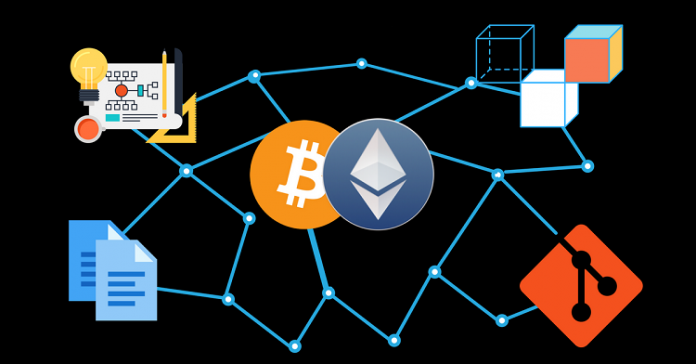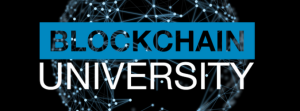
Virtual Reality. Touchless Interfaces. Fintech. Edge Computing. Blockchain – these are the technologies that will change the way we live in the next few years.
Today’s disruptive innovations are reshaping the world as we know it – blending the virtual sphere with the real world. And blockchain is pegged to make the biggest splash.
2018 looks set to be the year when some of these innovations begin to surface. Voice-activated assistants have moved on a step already, and virtual reality is poised to hit the mainstream big-time this year.
And so too blockchain.
Cryptocurrencies dominated the headlines in 2017 with the surge in prices of Bitcoin.
But crypto-assets are nothing without blockchain and the technology is one of the most exciting innovations to emerge from the wheel.
No wonder ambitious, tech-minded ninjas want to know how to become a blockchain developer.
How to combine IoT with blockchain – or BIoT – will be dominating the conversation in tech circles this year.
Blockchain technology and IoT has the potential to usher in a whole new system of buying and selling goods and service over the internet and with digital wallets stored on smartphones and other portable devices.
Financial analysts are already totting up the revenue BIoT will deliver as banks gradually start to integrate blockchain technologies.
There is a reluctance within the financial sphere to embrace cryptocurrencies and other digital assets, muted figures of US$1 billion over the next two years will not be passed up.
The big six banks are already developing their cryptocurrency.
Blockchain technology is a good area of business to get into right now. Developing an understanding of blockchain from the ground up will help engineers comprehend how BIoT can benefit the general public as it was initially intended to do.
Banks, of course, will have their agenda and are muscling in on the blockchain community.
But while the bulk of blockchain developers have a social conscious to serve the public, there is a chance the banks will not be able to manipulate the financial system the way they do with fiat currencies.
Understanding How Blockchain Works
Blockchain technology is a “disruptive skill” that few developers have yet to master.
Although still in its infant stages, cryptocurrencies which blockchains are directly related to are emerging quickly, and the demand for developers with knowledge of blockchain technology is at a premium.
If you have designs to become an engineer in the crypto space you need to get to grips with how blockchain works.
First, let’s run through a quick overview to put you in the bigger picture.
The blockchain is essentially a public ledger stored on the internet. It is comparable to a digital database that records transactions made by digital assets and cannot be changed or corrupted.
Each blockchain is time-stamped and linked to previous blocks in a chain by a process known as “hashing.”The purpose of blockchains is to create a public trade record that is regulated and updated by consensus of participants within the blockchain community.
Information is recorded by individual computers known as “nodes” which essentially mine the internet to collect data of transactions made using the cryptocurrency related to that specific blockchain.
Now, let’s get technical. There are mostly three principal technologies that create a blockchain:
- Private key cryptography: this serves a purpose of security
- A distributed network: this is the shared ledger that regulates transactions to eliminate fraud and tax evasion
- Incentives: rewards for “mining” companies to service blockchain and ensure security levels are maintained
A blockchain can be public, private, permission-based, centralised or decentralised.
The vision of Satoshi Nakamoto and the bulk of the blockchain community is to create a decentralised system that is both public (for regulation) and private (for privacy).
However, now financial institutions are pressuring government lawmakers to introduce laws and regulations, there is no telling whether blockchains will be a decentralised system as we move forward.
And this is potentially where blockchain freelancers that understand the technology from the ground up can be most influential.
Regardless of whether blockchain will be centralised or decentralised, the overriding goal is to ensure the technology creates a secure financial platform and a private digital identity for users.
Here’s how blockchain works in a few steps:
#1 A digital signature is created by matching cryptographic keys that are stored in private and public keys.
#2 Owners of cryptocurrencies are given a private and public key which confirms their ownership. The keys, if stored sensibly in a hardware wallet, also protect owners from having their cryptocurrency stolen by cybercriminals.
#3 Control of ownership confirms the person with the private key has the right to trade with cryptocurrency.
#4 The private key acts like the lock on a safe, or the pin number of a credit card. Its purpose is to ensure access is only permitted to owners.
#5 Users sending digital tokens to the receiver (i.e. a merchant) enters the recipients public key into their digital wallet.
#6 The public key of the sender is then matched with the public key of the person they are trading with for a transaction to be authorised.
#7 The public keys are then stored in the blockchain and sealed with a hash.
What Is a Distributed Network?
Another benefit blockchain technology is eliminating finance-related fraud and protect consumers from inadequate services or scams (although there are plenty of Bitcoin scams too).
Some of the most obvious provisions include smart contracts which protect the rights of buyers, and public ledgers eliminate tax avoidance scandals international corporations like Google, Starbucks and Amazon are notorious for.
Blockchains are mostly an extensive network of “nodes” that validate transactions using complex mathematical equations.
The purpose of the network is to create a “system of record” by reaching a consensus that specific action was witnessed at the same time – A sent X amount of money to B at this precise time.
Every time validation is performed, miners have to create a block by sealing transactions with a hash. This is accomplished by running sophisticated algorithms to work out a random and incorruptible sequence of numbers, letters and symbols.
Once the block is sealed and added to the previous block – hence the term blockchain – the record cannot be altered.
To read more about this process, check our guide on What Is Cryptocurrency Mining.
The Role Of Blockchain Developer Explained
The biggest problem with internet shopping is security.
Blockchain technology looks to resolve these issues. However, there are still multiple vulnerabilities in codes that can be breached by sophisticated hackers.
The responsibility of a dedicated blockchain developer will depend on the involvement of the company you work for.
One of the key roles blockchain developers will be responsible for is to update and maintain security measures within a blockchain, private clients (in the case of freelancers) or the company you work for.
If you work for a company that is developing its own ICO, you will need an in-depth knowledge of algorithms to design advanced security codes that are impregnable.
A solid understanding of coding is imperative for top-level blockchain developers.
Blockchain developers will also be tasked with managing online resources about the demands of the network.
You will have to know how to handle remote and local queries which require an in-depth understanding of how the blockchain you are operating with functions.
If you are designing an ICO, you will need to figure out how the technology can function in the real world and provide benefits to end-users.
Not only that, but you will have to develop a cryptocurrency that outperforms your rivals otherwise you will soon be out of a job.
Blockchain developers that are working for companies that mine cryptocurrencies are responsible for creating a hash.
Every block that is sealed is rewarded with a set amount of the currency you are mining. The actual amount will change over time and is different from one coin to the next.
Creating a hash is imperative for the survival of a crypto mining company.
A hash is generated using SHA-2 which are a mathematical operations run on digital data. The goal of a blockchain developer is to work out the algorithm that seals the blockchain.
University Degrees For Blockchain Developers
Blockchain development is a specialist skill.
Major corporations in multiple industries including finance, retail and technology are crying out for qualified engineers; there is a significant uptick in job openings.
According to Upwork, blockchain development is the 2nd fastest growing industry right now, and as cryptocurrencies filter into the mainstream, there will be an even more significant demand for technologists.
Experts say that demand for blockchain developers is outstripping supply.
As a result, courses for blockchain engineering have been added to the curriculum of tech-oriented Universities including Cornell, Cambridge and Stanford.
Graduates that already have a university degree in computer science or computer engineering are well placed to apply for jobs in the crypto-space.
And companies are willing to pay more than $100,000+ for skilled technicians with experience of JavaScript and Python language code.
Experience as a back-end developer is obviously a crucial factor, and a solid understanding of code is vital. Blockchain developers also need to know the fundamentals of cryptography while knowledge of machine learning is a plus.
If you don’t already have these skills, further training courses are available at universities – and some companies may be willing to pay for your education if you can show you already have a robust skill set of backend software development.
Developers with experience will probably not feel like blockchain technology is new ground for them.
Online Courses For Blockchain Developers
Developers that do not have the time, finances or inclination to attend a university, should look into online blockchain development courses.
There are plenty on offer, and although they will not be as comprehensive as a course with a leading university, online courses are far less expensive and – with dedication – quicker to develop the skills you need.
If you don’t have any funds whatsoever to spend on your education, you can even get started with a free online course for blockchain developers and take your learning and development from there.
How To Get a Job As a Blockchain Developer?

Blockchain technology is not a single skill set that requires every developer to perform the same roles.
The technology itself is a stack, and there are a variety of roles related to blockchain engineering. Even aspiring blockchain developers have an opportunity to get a “foot in the door.”
Experienced developers can demand an attractive salary for creating and running distributed ledgers although these roles are not in abundance.
However, companies are typically looking to build a team around a blockchain expert.
This is a good way for many aspiring engineers to earn while you learn and gain valuable experience to put on your CV.
Entry-level qualifications are a strong background in software development and a basic understanding of blockchain principles.
Experience in networking and security is desirable, but an awareness of modern technology tools and microservice architecture will leverage your opportunities of landing a job.
A quick job search on Google will bring up multiple jobs for blockchain development roles. To increase your prospects sign up with job sites that specialise in IT and technology jobs, but in particularly blockchain like these below:
Overall
If you want to know more about how to become a blockchain developer, hit the blockchain forums and ask the community of developers that have firsthand experience.
At the very least, they will be able to point you in the right direction – but you never know, you may even find an opportunity to work with a freelance blockchain developer that is willing to teach you the ropes.
If you need more information on the technology, read our guide to Distributed Ledger Technology.



![Bitcoin Buyer Review of Official Website [2022] bitcoin buyer review featured image](https://bitemycoin.com/wp-content/uploads/2022/04/bitcoin-buyer-review-featured-218x150.jpg)
![Bitcoin Digital | Official Website Review [2022] bitcoin digital review featured](https://bitemycoin.com/wp-content/uploads/2022/04/bitcoin-digital-featured-218x150.jpg)




